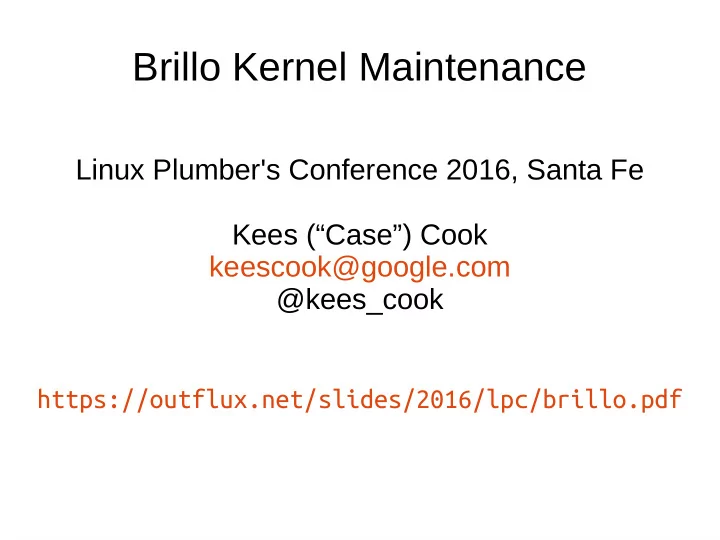

Brillo Kernel Maintenance Linux Plumber's Conference 2016, Santa Fe Kees (“Case”) Cook keescook@google.com @kees_cook https://outflux.net/slides/2016/lpc/brillo.pdf
Agenda ● Brillo ● Existing problems ● New problems ● Solutions! ● One kernel to rule them all ● Delta reduction ● LTS to LTS upgrades ● Test test test ● Sanity check
Brillo ● IoT with an Android stack – May not have screen for display/input – May have GPIO or other fun buses ● Mix of vendors from handsets to embedded ● Still relatively early in development
Existing problems ● kernel prebuilts ● multiple tree origins – upstream – Android common – Vendor tree ● kernel version is static to device – must backport fixes and features – must forward-port out-of-tree drivers ● exponential set of combinations to update/test
New problems ● Support must be at least 5 years after last device is sold – No one notices exponential work when it's small...
Solutions! ● One kernel: Reduce backporting work by keeping a single kernel ● Delta reduction: Reduce forward-porting work by keeping everything upstream ● If this is too scary … you're not testing thoroughly enough
One kernel to rule them all ● Single in-tree kernel with Android patches and all vendor patches ● Per-product arch and CONFIG declarations ● Vendor patches must have at least been sent upstream, and are cherry-picked back ● Kernel is latest upstream LTS and receives regular -stable patches ● Kernel version moves forward
Delta reduction ● Android common kernel has over 600 patches on top of upstream ● Mattias Nissler consolidated these to under 150 patches – fix Android userspace to not need special cases, or use upstream alternatives – collapse small fixes into the corresponding feature patches and remove patch/revert pairs – upstream any low-hanging fruit
LTS to LTS upgrades ● Forward port anything not already in next LTS ● First attempt at this went smoothly: v4.1 → v4.4
Test test test ● Afraid of regressions? ● Get code into upstream (ohai HiKey) ● Build automated tests – If you can't tell me what you're afraid of breaking then you can't tell me we shouldn't upgrade – If you can't test what you're afraid of breaking, how can you verify that it works in the first place? – Yes, it's hard. So is everything else, but you do this once ● Test linux-next and linux-stable (kernelci.org) ● Catch things before they're in the next LTS
Sanity check ● Will this work? – I really hope so! We have to try something to get out of the ancient kernel quagmire and off the backport treadmill. ● Will the vendors agree to this? – Most already have and are fairly proactive about upstreaming. – Those with reservations must decide if they're more terrified of the up-front costs of upstreaming or the long-term costs of having a support duration way beyond what they're used to.
Questions / Comments / Flames Kees (“Case”) Cook keescook@google.com @kees_cook https://outflux.net/slides/2016/lpc/brillo.pdf https://goo.gl/IRlZ1B https://android.googlesource.com/device/generic/brillo/+/master/docs/KernelDevelopmentGuide.md
Recommend
More recommend